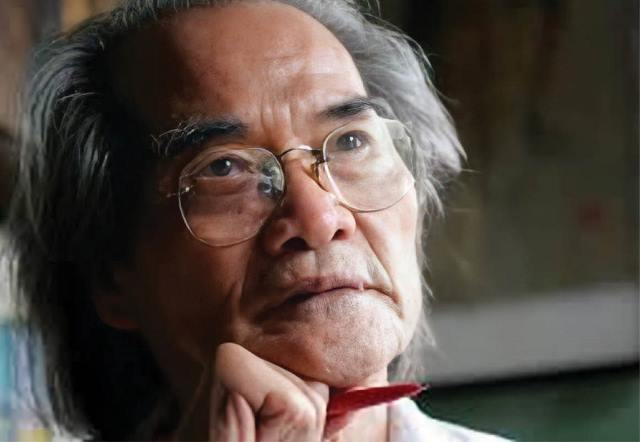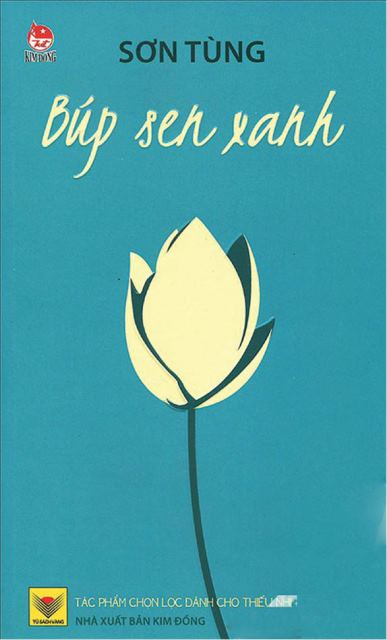
Son Tung. Photo: Nguyen Dinh Toan
An honor to meet Uncle Ho
His full name is Bui Son Tung and his pen name is Son Phong during the time he worked as a war correspondent in the Southern battlefield (1967-1971)
Thirteen out of nearly 30 books by Son Tung are about Nguyen Tat Thanh, i.e. Uncle Ho, or President Ho Chi Minh. His most successful book is “The Green Lotus”, which has been printed 30 times and translated into many languages in the world.
With his great and tireless dedication, the disabled writer Son Tung was conferred by the government the noble title of “Labor Hero in the New Age” in 2011. His book "The Green Lotus" was awarded the special prize by the Vietnam Writers’ Association.
It seems that Son Tung was predestined to write “The Green Lotus.” As early as 1948 - 1949, Son Tung had the opportunity to meet Mrs. Nguyen Thi Thanh and Mr. Nguyen Tat Dat, Uncle Ho's elder sister and elder brother, who provided him with many lively documents about their family, including the younger brother Nguyen Sinh Con (or Cung) - Nguyen Tat Thanh during the time he was active in the Youth Union for National Salvation in Nghe An Province.
Later, while he was working as a reporter for the Pioneer newspaper in Hanoi, in 1962 - 1963 Son Tung had his honor to meet Uncle Ho again when he was assigned to write about Uncle Ho's trips and his relationship with farmers, workers, and soldiers.

The novel “The Green Lotus” by Son Tung. Photo: TL
Son Tung had many deep memories with Hue imperial capital. After the reunification of the country, he had many long field trips to Hue to collect documents for the book “The Green Lotus" with the wholehearted and effective assistance of his wife Phan Hong Mai.
Despite the severe injury left on his body by the war, Son Tung contacted in person many people in Hue and visited many landscapes and historical relics, especially the Perfume river, the Ngu Binh mount, the Imperial City, the souvenir houses of President Ho Chi Minh in childhood on Mai Thuc Loan Str. and in Duong No Village (Phu Vang), the Dong Ba market, the Xep market, the Mai market, etc.
Thanks to those visits, he could describe vividly and appealingly the people and the landscapes of Hue imperial capital during the time when Nguyen Sinh Sac (Uncle Ho’s father) brought his wife and children to Duong No Village, Hue teaching and preparing for his Hoi exam.
“The Green Lotus” by Son Tung blends the scent of the Lotus village in Nam Dan, Nghe An with the fragrance of lotuses in Tinh Tam lake in Hue where Uncle Ho spent his childhood.
During his lifetime, after "The Green Lotus" was born and attracted public attention, in 1982, Son Tung was invited to a casual meeting with Prime Minister Pham Van Dong. The Prime Minister wanted to grant him a house in Lieu Giai Str. in Ha Noi, but Son Tung refused.
Ten years later, when Son Tung became well known for “The Green Lotus", Hanoi Youth Union also wanted to present him a “house of gratitude,” but again, he refused, saying that he wanted them to give the house to those who were more in need and he continued writing for people and for his country in a room of 11m2. Later he moved to a bigger room (22m2) on the second floor of Block A at Van Chuong Dormitory in Dong Da, Hanoi.
Although the room was small in area, it became a cozy place where Son Tung received his writer friends and artists, the intellectual and readers in and out of the country. There both guests and the host sat on the floor, talked and drank tea without any distances.
Extraordinary will and creativity
Son Tung was a permanent heavily-wounded veteran (1/4). He was badly wounded in a bombardment in the Southeast battlefield in April 1971.
After the treatment, 14 pieces of M19 bullets are still trapped in his body. Three fragments of American bullets penetrated deep into his skull, which sometimes make him fall into unconsciousness. Many others damaged his left shoulder and paralyzed his left arm. His hands contracted and his eyesight was only 1/10.
However, he tried to overcome all his physical pain to continue to write in his capacity and his own style.
During his first years of recovery, he had to tie his pen to his right hand with rubber bands in order to write while suffering from the pain of the wound. Sometimes he had people tie him to the chair at night so that he could sit and wrote without falling down due to the wound in his head. His will was extraordinary.
Son Tung was considered the most successful and prolific writer about Uncle Ho. Besides "The Green Lotus,” he also wrote "The Golden Lotus", "Hibiscus", "Heart of the Earth", "Nguyen Ai Quoc in the Memory of a Russian Mother", "From the Lotus Village,” “The Teacher Nguyen Tat Thanh at Duc Thanh School,” “Sunshine Garden", "Ho Chi Minh: The Light of Heart," “Uncle Ho Returned," “Uncle Ho is Here,” etc.
As for the war theme, Son Tung wrote the novels "Sunshine Garden", "Concave", "Man and his Road". As for the theme of revolutionary heroes and culture and history characters, he wrote “Tran Phu", "Nguyen Huu Tien,” “The Man Who Draws the National Flag,” etc.
“Son Tung has passed away. He was a special person and a special writer. He set an example for people with his extraordinary will and creativity. Adieu,” wrote Nguyễn Quang Thieu, Chairman of Vietnam Writers’ Association with emotion on his personal webpage.
By Bui Ngoc Quynh